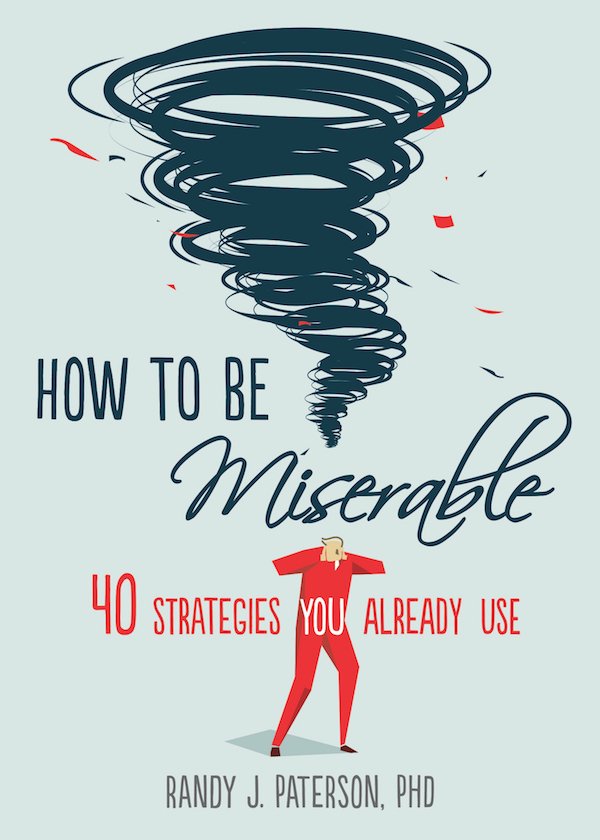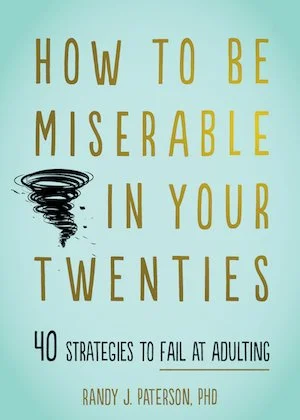
Public talks for your organization, team, meeting, or conference
In person
and live-online…
I offer talks and workshops for organizations and the public on a variety of psychological topics. Whether it's a speaker for a fundraiser, a keynote for a conference, a trainer for a corporate wellness retreat, a weekend intensive, or a guest presenter for a seminar series, I may have something that would match your requirements.
Although many organizations in recent years have preferred the convenience of live-online presentations, I am also available for in-person talks, keynotes, and programs.
The list below is a sample of the programs I have offered; it is not exhaustive. Contact me to initiate a discussion about the type of presentation you might like. If I am unable to help, I can often direct you to someone who would make an excellent speaker for your group.
All presentations are prepared or adjusted to suit the needs of the participants.
-

How to be Miserable: Strategies You Already Use
We spend much of our lives trying to be happier - and not doing very well. But what if, for some reason, you wanted to be miserable rather than happy? Based on the book of the same name, this humour-filled talk (or short workshop) invites participants to consider what they might do if their goal was to feel worse rather than better - a journey that incorporates current research on both depression and happiness.
-

How to be Miserable in Your Twenties: Keys to a Better Adulthood
Early adulthood is challenging for all of us. How do you build a satisfying and sustainable life? There are major challenges to face and major pitfalls to avoid. This talk, based on the book of the same name, presents a roadmap through the minefield of the 20s - and is suitable for older teens (and parents) as well.
-

Asserting Yourself: Creating and Sustaining Healthy Boundaries
Who better to teach you assertiveness than the guy who wrote the book? In a single talk or a short series, this presentation provides specific strategies for controlling your own steps in the dance in any relationship - and doing so in a way that brings about effective change rather than hostile confrontation.
-

The Parent Trap: How to Step Back and Let Young Adults Thrive
Many young adults are experiencing profound difficulties at the gap between dependent adolescence and independent adulthood. In their efforts to help, many parents find they are slowing down the process instead. When a young adult is overly dependent on parents for financial or practical support, a power struggle often develops - one that serves mainly to grind progress to a halt. This talk discusses what parents can do to support their young adult’s capacity and development.
-

Failure to Launch: What is it and How Does it Happen?
All over the world, young adults are finding it increasingly difficult to make the leap from dependent adolescence to independent adulthood. In extreme cases they may be virtually housebound, unable or unwilling to move forward with work, education, relationships, or finances. How does this happen? How does our culture contribute to the problem? How do people escape from isolation and move forward into adult life?
-

Misery for Two: How to Foul Up a Perfectly Good Relationship
How do you sustain a satisfying relationship? This is a question we’ve all asked at one point or another - but we’ve avoided asking the opposite: What if we wanted to sabotage it instead? Answering that question may reveal much of what we’re already doing - and point the way to the opposite. A talk based on ideas from the popular Misery books about the ways we sabotage our own happiness. Available as a general topic, plus one specifically for same-sex relationships.
-

You Better Move: The Link Between Exercise and Mental Health
“Get some exercise, it’ll be good for you.” Well fine, but will it? This talk looks at the surprisingly powerful evidence for exercise as a treatment for depression, anxiety, and stress, and provides concrete tips to make the most of what some believe is the most powerful psychological intervention yet developed.
-

Too Perfect: The Nature and Treatment of OCD
Obsessive compulsive disorder can seem bizarre at first look, but it’s actually an extremely common problem that arises naturally from the interaction between anxiety and human psychology. There appear to be seeds of OCD within us all. This entertaining yet instructive talk describes its form, development, and management - including when it’s time to seek outside help.
-
Achieving Your Vision: 10 Ways to Boost Your Goal Setting
"We are unlikely to arrive at our destination unless we know what it is." But how do you create a life vision, and what elements are important? This talk reviews both the envisioning process and the week-to-week goal-setting that can get us there. By following a few simple rules, we can enhance our progress and overcome our inertia.
-

How to Buy Happiness
People say you can’t buy happiness, but poor financial decision-making can absolutely buy misery. Our life satisfaction is very much associated with the way we handle and manage money. This talk provides specific, actionable advice about how to use money for emotional gain.
-

OverLoad: Unpacking the Overstuffed Life
“I’m too busy!” Time stress is one of the primary causes of burnout and anxiety. How do you juggle multiple responsibilities and still find time for yourself? Answer: By carefully examining input rates, output strategy, and throughput timing, we can get more done, feel more relaxed, and have more time for ourselves. This talk provides specific strategies to lighten the load.
-

Toxic Optimism: How Positive Thinking Creates Bad Outcomes
Pessimism gets a bad rap, but optimism gets too much praise. Excessive and inappropriate optimism is the cause of much addiction, criminality, business failure, burnout, and more. This talk looks at the downsides of unrealistic optimism and ways to detect it in action in our own lives.
-

StressLess: Managing Stress in Real Life
The stress response is designed to boost short-term coping with physical threats - but it gets activated in situations where it does more harm than good. This presentation - a single talk or an in-depth series - provides participants with a better understanding of stress and concrete practices to reduce its harmful impact in our lives.
-

Out of the Blue: Understanding Depression
By some estimates, clinical depression is the single most common cause of disability in the developed world, but most people’s understanding of it is hazy at best. This talk - or series - defines depression and describes effective self-management strategies, resources, and recommendations for care. Good for HR staff, managers, employees - and just about everyone else. Based on principles from the speaker's book.
-

The Pillars of Happiness
The past 30 years has seen an explosion of interest in the determinants of life satisfaction - and it turns out that many of these are controllable skills that anyone can put into practice. This talk emphasizes four primary strategies to boost mood - strategies that users can put into action immediately.
-

Anxiety Gone Wild: When is it a Disorder?
Anxiety is not a mental disorder. It is an essential aspect of being human. But it can get out of control and severely impact our lives, at which point help and focussed attention may be indicated. This talk describes the most common manifestations of anxiety gone wild: Social phobia, panic attacks, agoraphobia, obsessive compulsive disorder, generalized anxiety, and post-traumatic symptoms, and describes how all have the common features of anxiety and avoidance - and how focusing exclusively on reducing the anxiety can make both features worse rather than better.
-

Hedonic Forecasting: The Hidden Decision-Maker
Every day we make hundreds of decisions, and most of them are based on hedonic forecasting: Our beliefs about how we will feel in the future. Oddly, human beings are systematically terrible at making these predictions, with the result that we become architects of our own unhappiness. This talk may change the way you think about your life - and it provides a much-needed corrective strategy to improve your decision-making strategy.
-

How to Raise a Miserable Kid
All parents want their children to have happy, successful lives - but what can they do to help bring that about? One strategy is to look closely at what they would do if they were aiming for misery instead - and discover how their best intentions may be leading things astray. This is a talk that provides specific strategies to provide children with the resilience they need when the seas of life get stormy.
-

Slippage: Perception Versus Reality
Cognitive therapists examine the subtle distortions that get in the way of a balanced perception of the world outside. This talk entertainingly reveals some of the ways that human psychology contributes to a misperception of the world, from visual illusions to the Monty Hall Problem to predictive heuristics. Has anyone ever said that you don’t live in the real world? Well you don't! But, of course, no one else does either...
-

Letting Go: An Essential Life Skill
Much of popular psychology is about controlling our destiny, seizing life by the horns, and making things happen. But what can seem like defeat can actually open us to new possibilities. And fixation (the inability to let go) is at the core of much human misery. This talk explores the many ways that the capacity to let things go lies at the heart of the balanced life.

